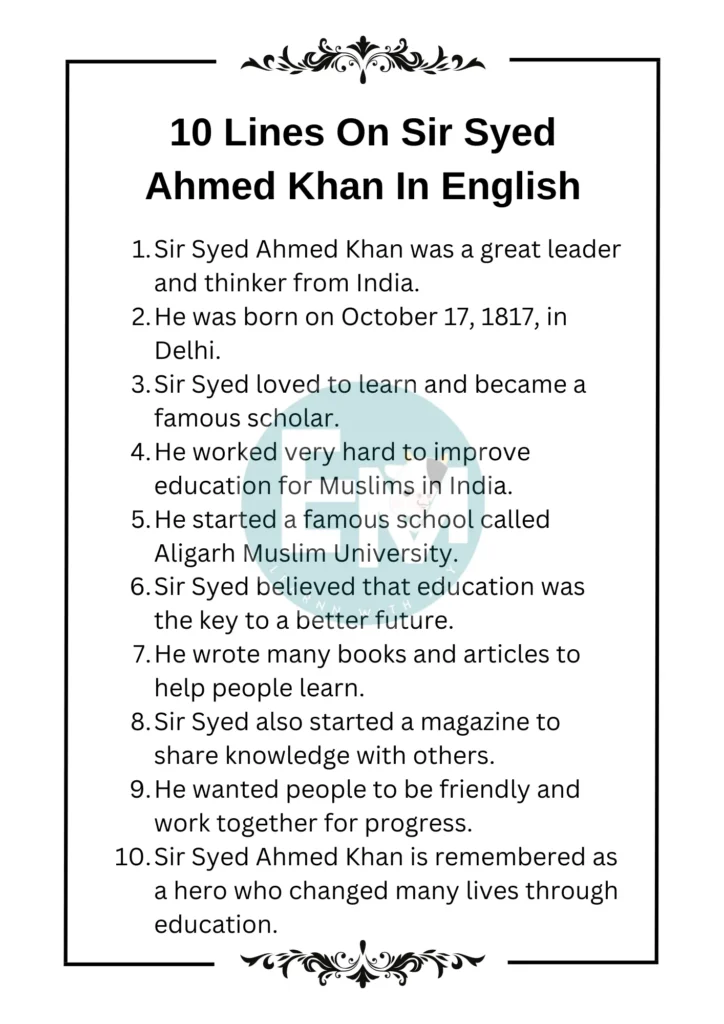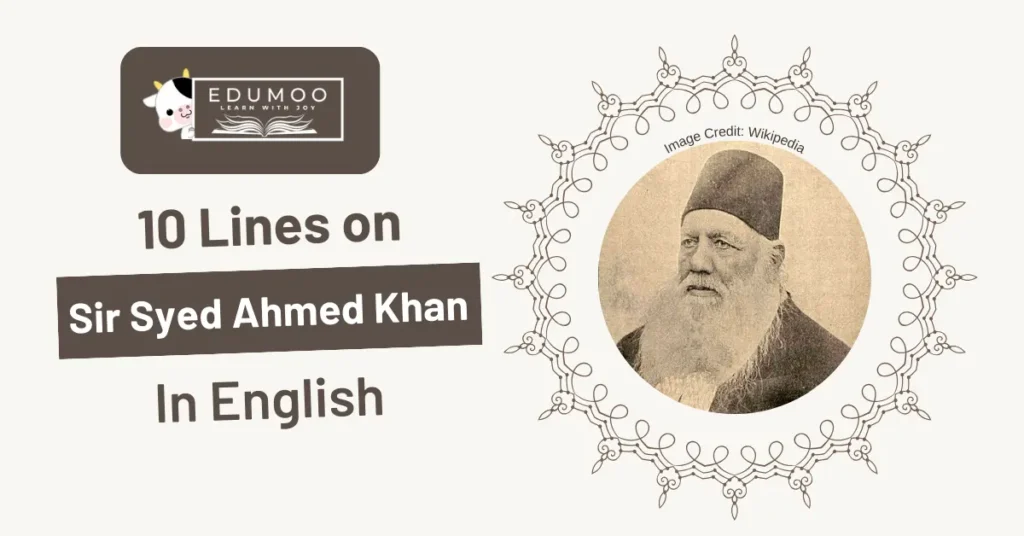Sir Syed Ahmed Khan was a remarkable leader and thinker who played a significant role in improving education for Muslims in India. Born on October 17, 1817, in Delhi, he was a passionate scholar who believed that education was the key to a better future. He founded the famous Aligarh Muslim University and wrote many books and articles to spread knowledge. Sir Syed also started a magazine to share ideas and encourage people to work together for progress. Check 10 lines on Sir Syed Ahmed Khan and essay on Sir Syed Ahmed Khan.
10 Lines On Sir Syed Ahmed Khan In English
- Sir Syed Ahmed Khan was a great leader and thinker from India.
- He was born on October 17, 1817, in Delhi.
- Sir Syed loved to learn and became a famous scholar.
- He worked very hard to improve education for Muslims in India.
- He started a famous school called Aligarh Muslim University.
- Sir Syed believed that education was the key to a better future.
- He wrote many books and articles to help people learn.
- Sir Syed also started a magazine to share knowledge with others.
- He wanted people to be friendly and work together for progress.
- Sir Syed Ahmed Khan is remembered as a hero who changed many lives through education.

Essay On Sir Syed Ahmed Khan In English In 350 Words
Sir Syed Ahmed Khan, born on October 17, 1817, in Delhi, was a visionary leader who made significant contributions to the upliftment of Muslims in India through education and social reform. At a time when India was under British rule, Sir Syed recognized the critical need for modern education to empower the Muslim community and bridge the gap between traditional and contemporary knowledge.
From a young age, Sir Syed showed a keen interest in learning and scholarship. He mastered various subjects, including languages, science, and history, which laid the foundation for his future endeavors. He believed that education was the key to progress and worked tirelessly to promote it among Muslims, who were lagging behind in educational attainment compared to other communities.
One of Sir Syed’s most notable achievements was the founding of the Muhammadan Anglo-Oriental College in 1875, which later became Aligarh Muslim University (AMU). His vision for the college was to blend traditional Islamic education with modern Western education, thus preparing students to meet the challenges of the contemporary world. AMU played a pivotal role in transforming the educational landscape of India and produced many prominent leaders and scholars.
Apart from his contributions to education, Sir Syed was also a prolific writer and social reformer. He authored numerous books and articles, advocating for scientific knowledge, rational thinking, and social harmony. He started the journal “Tahzib-ul-Akhlaq” to promote modern ideas and encourage critical thinking among Muslims.
Sir Syed’s efforts extended beyond education. He emphasized the importance of unity and cooperation among different communities in India. He believed that progress could only be achieved through mutual respect and understanding. His advocacy for modern education and social reform laid the groundwork for the intellectual and cultural renaissance of Muslims in India.
In conclusion, Sir Syed Ahmed Khan’s legacy as a pioneer of modern education and a champion of social reform remains influential. His dedication to education and his vision for a progressive society have left an indelible mark on the history of India. Sir Syed’s life and work continue to inspire generations to value education, embrace modernity, and strive for social harmony.
| Also Read: 10 Lines On Cow In English |
Essay On Sir Syed Ahmed Khan In English In 750 Words
Sir Syed Ahmed Khan, born on October 17, 1817, in Delhi, was a prominent scholar, reformer, and visionary leader who played a crucial role in the socio-educational upliftment of Muslims in India.
His life and work were marked by his commitment to education, social reform, and the promotion of modern scientific thinking among Muslims during the 19th century. Sir Syed’s contributions laid the foundation for the modern education system in India and inspired generations to embrace learning and progress.
Sir Syed Ahmed Khan was born into a noble family with a rich cultural and educational heritage. His family valued education, which influenced Sir Syed’s early interest in learning. He studied traditional subjects like Persian, Arabic, and Islamic teachings. Later, he mastered English and Western sciences, recognizing the importance of modern education for progress.
Sir Syed began his career as a civil servant in the British East India Company. During his tenure, he witnessed the socio-economic and educational backwardness of Muslims, which deeply concerned him. He realized that the community’s progress depended on embracing modern education and scientific thinking. To address these issues, Sir Syed started his reformist efforts.
One of his first initiatives was the establishment of the Gulshan School in Muradabad in 1859, followed by the Victoria School in Ghazipur in 1863. These institutions aimed to provide modern education to Muslims, blending traditional Islamic teachings with contemporary subjects. Sir Syed believed that a balanced education system could bridge the gap between the Muslim community and the rapidly advancing world.
The turning point in Sir Syed’s reformist journey was the foundation of the Aligarh Movement. This movement aimed to modernize Muslim education and promote social and political awareness among Muslims in India.
In 1875, Sir Syed founded the Muhammadan Anglo-Oriental College in Aligarh, which later became the Aligarh Muslim University (AMU). The college was modeled after British universities and combined Western scientific education with Islamic teachings.
The establishment of AMU was a significant milestone in the history of Muslim education in India. It provided a platform for Muslims to receive quality education and empowered them to compete with their peers in various fields. Sir Syed’s vision for AMU was to create a generation of educated Muslims who could contribute to the nation’s progress and development.
Apart from his educational endeavors, Sir Syed was a prolific writer and thinker. He authored numerous books, essays, and articles on various subjects, including history, politics, religion, and education.
His most famous works include “Asar-us-Sanadid,” a historical account of Delhi’s monuments, and “Tahzeeb-ul-Akhlaq,” a journal aimed at promoting social reforms and modern thinking among Muslims.
Through his writings, Sir Syed emphasized the importance of critical thinking, scientific inquiry, and rationalism. He encouraged Muslims to adopt a progressive mindset and discard outdated customs and superstitions.
His efforts to reinterpret Islamic teachings in the light of modern knowledge made him a controversial yet influential figure in the Muslim community.
Sir Syed Ahmed Khan was not just an educational reformer but also a social and political visionary. He believed in the importance of Hindu-Muslim unity and worked towards fostering communal harmony in India.
He urged Muslims to learn English and Western sciences to better understand and interact with the British rulers. Sir Syed also played a crucial role in establishing the Scientific Society of Aligarh, which aimed to translate Western works into Indian languages and promote scientific knowledge.
Despite his efforts to modernize Muslim society, Sir Syed faced significant opposition from conservative elements within the community. However, his determination and perseverance eventually led to widespread acceptance of his ideas. His contributions were instrumental in shaping the modern identity of Indian Muslims and their role in the country’s socio-political landscape.
Sir Syed Ahmed Khan’s legacy continues to inspire generations. His vision for a progressive, educated, and united Muslim community has left an indelible mark on India’s educational and social fabric. Aligarh Muslim University, his most significant achievement, remains a prestigious institution, nurturing thousands of students and contributing to the nation’s intellectual and cultural growth.
In recognition of his immense contributions, Sir Syed was knighted by the British government in 1888, earning him the title “Sir.” His work laid the foundation for the modern education system in India and highlighted the importance of education as a tool for social transformation.
Sir Syed Ahmed Khan was a pioneer who dedicated his life to the upliftment of Muslims in India through education and social reform. His efforts to modernize education and promote rational thinking have had a lasting impact on Indian society.
Sir Syed’s vision of a progressive, educated community continues to inspire and guide future generations. His life and work remind us of the transformative power of education and the importance of embracing change for the greater good of society.
Conclusion
Today, we have learned 10 lines on Sir Syed Ahmed Khan in English. He is remembered as a hero who changed many lives through his dedication to education. His efforts to promote learning and unity have left a lasting impact on India. By founding Aligarh Muslim University and sharing his knowledge, Sir Syed showed the importance of education in building a better future. He continues to inspire people to value learning and work together for the common good.

